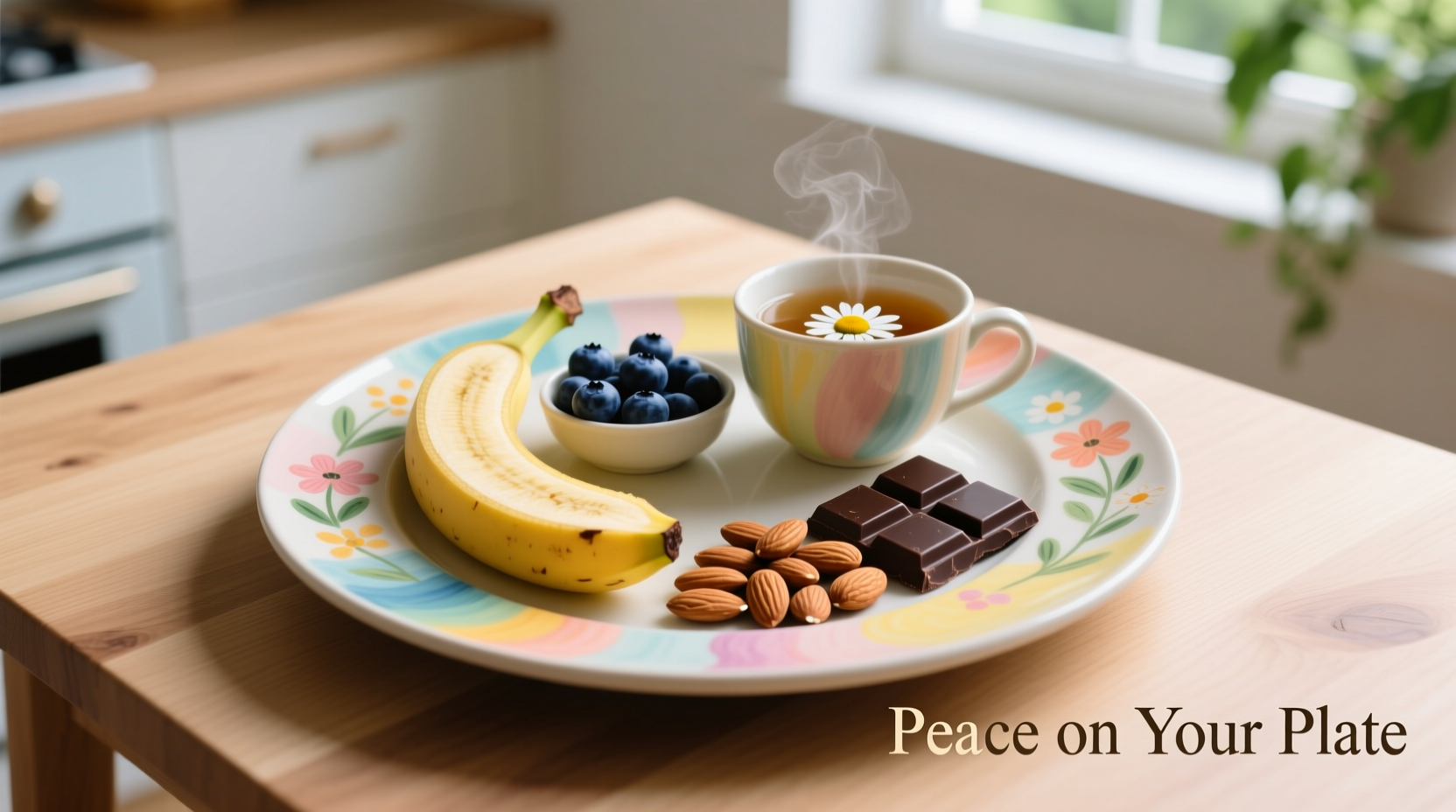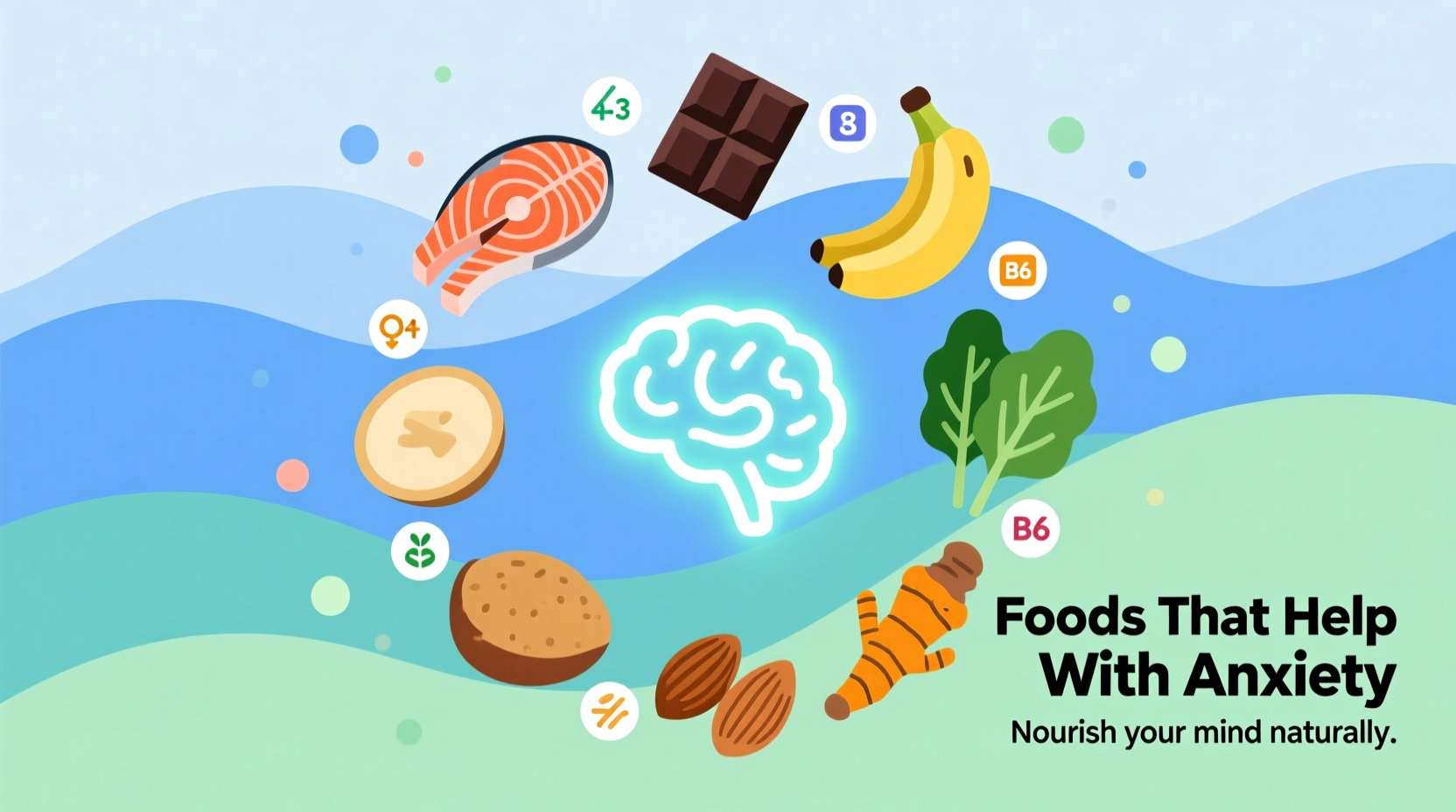If you're searching for natural ways to manage anxiety, certain foods can make a meaningful difference. Based on current nutritional science, the most effective anxiety-reducing foods include fatty fish rich in omega-3s, dark leafy greens packed with magnesium, fermented foods containing probiotics, nuts and seeds high in zinc, complex carbohydrates like oats, turmeric with curcumin, and dark chocolate (70%+ cacao). These foods work by supporting neurotransmitter production, reducing inflammation, and regulating stress hormones—but they complement rather than replace professional treatment for anxiety disorders.
When anxiety strikes, your body enters fight-or-flight mode, triggering physiological changes that can feel overwhelming. While professional treatment remains essential for anxiety disorders, emerging nutritional psychiatry research reveals how specific foods directly impact brain chemistry and stress response systems. This isn't about quick fixes or miracle cures—it's about understanding how everyday dietary choices can create a more resilient nervous system over time.
The Science Behind Food and Anxiety Relief
Nutritional psychiatry has transformed our understanding of how diet affects mental health. Your gut and brain communicate through the gut-brain axis, with 90% of serotonin (the "feel-good" neurotransmitter) produced in the digestive system. When you consume anxiety-reducing foods, you're essentially providing your body with the raw materials needed to regulate stress hormones and calm neural pathways.
Unlike pharmaceutical interventions that target single pathways, whole foods offer synergistic compounds that work together to support multiple aspects of neurological function. For example, magnesium in spinach doesn't just relax muscles—it also regulates the hypothalamic-pituitary-adrenal (HPA) axis, your body's central stress response system.
Top Anxiety-Reducing Foods and How to Use Them
Fatty Fish: Nature's Omega-3 Powerhouse
Fatty fish like salmon, mackerel, and sardines contain EPA and DHA omega-3 fatty acids that reduce brain inflammation and increase gray matter volume in areas regulating emotion. A 2022 meta-analysis in Nutritional Neuroscience found that regular consumption of omega-3 rich foods correlated with 20% lower anxiety scores compared to control groups.
Practical implementation: Aim for two 3-ounce servings weekly. Try baked salmon with lemon-dill sauce or canned sardines on whole-grain toast with avocado. For vegetarians, algae-based supplements provide plant-sourced DHA.
Leafy Greens: Magnesium for Nervous System Regulation
Spinach, Swiss chard, and kale deliver magnesium—a mineral that acts as a natural calcium channel blocker, preventing neuronal excitability. Research from the National Institutes of Health shows magnesium deficiency correlates strongly with increased anxiety symptoms, particularly in women.
Practical implementation: Add two cups of raw greens to smoothies or sauté with garlic and olive oil. Pair with vitamin C-rich foods like bell peppers to enhance magnesium absorption. The recommended daily intake is 310-420mg, easily achieved through dietary sources.
Fermented Foods: Gut-Brain Axis Supporters
Kefir, kimchi, sauerkraut, and miso contain probiotics that influence GABA production—the brain's primary inhibitory neurotransmitter. A landmark 2019 study published in Psychopharmacology demonstrated that participants consuming probiotic-rich foods for eight weeks showed significantly reduced cortisol levels and improved emotional reactivity.
Practical implementation: Start with ¼ cup daily of unpasteurized fermented foods. Add kimchi to scrambled eggs, enjoy kefir smoothies, or include miso soup with lunch. Gradually increase to avoid digestive discomfort as your microbiome adjusts.
| Food | Key Anxiety-Reducing Compounds | Recommended Daily Amount | Best Preparation Method |
|---|---|---|---|
| Fatty fish | EPA/DHA omega-3s | 6 oz twice weekly | Baked or grilled with lemon |
| Spinach | Magnesium, folate | 2 cups raw | Lightly sautéed with garlic |
| Kefir | L. helveticus, B. longum | ½ cup daily | Plain, unsweetened |
| Pumpkin seeds | Zinc, magnesium | ¼ cup | Dry roasted, unsalted |
| Dark chocolate | Flavanols, theobromine | 1 oz (70%+ cacao) | Raw, minimally processed |
Nuts and Seeds: Zinc for Neurotransmitter Balance
Pumpkin seeds, cashews, and almonds provide zinc, which regulates the brain and pituitary's response to stress. Zinc deficiency has been documented in multiple anxiety disorder studies, with supplementation showing measurable symptom improvement. The Linus Pauling Institute notes that zinc plays a critical role in modulating the brain's response to stressful situations.
Practical implementation: Keep a small container of mixed nuts at your desk for stress-snacking. Add pumpkin seeds to salads or oatmeal. A quarter-cup serving provides approximately 2.5mg of zinc—about 25% of your daily needs.
Complex Carbohydrates: Serotonin Supporters
Whole grains like oats, quinoa, and brown rice maintain steady blood sugar levels, preventing the adrenaline spikes that accompany sugar crashes. The American Journal of Clinical Nutrition reports that low-glycemic diets correlate with lower anxiety levels, as stable glucose supports consistent neurotransmitter production.
Practical implementation: Choose steel-cut oats over instant varieties. Pair carbohydrates with protein (like Greek yogurt) to further stabilize blood sugar. Morning oatmeal with chia seeds and berries makes an ideal anxiety-reducing breakfast.
Turmeric: Inflammation Fighter
Curcumin, turmeric's active compound, increases brain-derived neurotrophic factor (BDNF) while reducing inflammatory markers linked to anxiety. Research from the University of California demonstrated that curcumin supplementation produced anxiety-reducing effects comparable to certain pharmaceuticals in animal models, with human trials showing promising results.
Practical implementation: Combine ½ teaspoon turmeric with black pepper (to enhance absorption) and healthy fat (like coconut oil) in golden milk or soups. The Arthritis Foundation recommends 500-1,000mg of curcumin daily for therapeutic effects.
Dark Chocolate: Theobromine Benefits
Dark chocolate (70% cacao or higher) contains flavanols that improve blood flow to the brain and reduce stress hormones. A 2021 study in Frontiers in Nutrition found that daily consumption of high-cacao chocolate lowered perceived stress levels in participants over a three-week period.
Practical implementation: Choose minimally processed dark chocolate with minimal added sugar. Enjoy one square (about 20g) mid-afternoon when stress typically peaks. Pair with a magnesium-rich food like almonds for enhanced effects.
Important Context and Limitations
While these foods can support anxiety management, it's crucial to understand their role within a comprehensive approach. Nutritional interventions typically require 4-8 weeks to show measurable effects, unlike fast-acting medications. The National Institute of Mental Health emphasizes that dietary changes should complement—not replace—evidence-based treatments like cognitive behavioral therapy or prescribed medications for diagnosed anxiety disorders.
Certain populations require special considerations: pregnant women should limit tuna consumption due to mercury concerns, while those on SSRIs should consult doctors before significantly increasing tryptophan-rich foods. Always discuss dietary changes with your healthcare provider, especially if taking medication for anxiety.

Creating Your Anxiety-Reducing Meal Plan
Implementing these foods effectively requires strategic planning. Start by identifying your anxiety triggers—morning stress might benefit from magnesium-rich breakfasts, while work-related afternoon anxiety responds well to protein-fortified snacks. Track your food and mood for two weeks using a simple journal to identify personal patterns.
Begin with one dietary change per week to avoid overwhelm. Week one might focus on adding leafy greens to two meals daily, while week two introduces fermented foods. This gradual approach creates sustainable habits rather than overwhelming dietary overhauls that rarely last.
Remember that hydration significantly impacts anxiety levels—dehydration increases cortisol production. Pair your anxiety-reducing foods with adequate water intake (approximately half your body weight in ounces daily). Herbal teas like chamomile or lemon balm provide additional calming benefits without caffeine's anxiety-exacerbating effects.
When Food Isn't Enough: Recognizing the Need for Professional Help
Nutrition plays a supportive role in anxiety management, but persistent symptoms require professional evaluation. The Anxiety and Depression Association of America notes that when anxiety interferes with daily functioning for more than two weeks, it's time to seek help from a mental health professional. Foods that help with anxiety work best as part of a holistic approach that may include therapy, medication, exercise, and stress management techniques.











 浙公网安备
33010002000092号
浙公网安备
33010002000092号 浙B2-20120091-4
浙B2-20120091-4